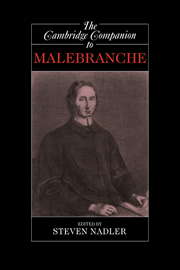Book contents
- Frontmatter
- Introduction
- 1 Malebranche and Method
- 2 Malebranche on the Soul
- 3 Malebranche on Ideas and the Vision in God
- 4 The Malebranche-Arnauld Debate
- 5 Malebranche on Causation
- 6 Metaphysics and Philosophy
- 7 Malebranche's Theodicy
- 8 Malebranche on Human Freedom
- 9 Malebranche's Moral Philosophy
- 10 The Critical Reception of Malebranche, from His Own Time to the End of the Eighteenth Century
- 11 Malebranche's Life and Legacy
- Bibliography
- Index
10 - The Critical Reception of Malebranche, from His Own Time to the End of the Eighteenth Century
Published online by Cambridge University Press: 28 May 2006
- Frontmatter
- Introduction
- 1 Malebranche and Method
- 2 Malebranche on the Soul
- 3 Malebranche on Ideas and the Vision in God
- 4 The Malebranche-Arnauld Debate
- 5 Malebranche on Causation
- 6 Metaphysics and Philosophy
- 7 Malebranche's Theodicy
- 8 Malebranche on Human Freedom
- 9 Malebranche's Moral Philosophy
- 10 The Critical Reception of Malebranche, from His Own Time to the End of the Eighteenth Century
- 11 Malebranche's Life and Legacy
- Bibliography
- Index
Summary
Malebranche was the master of an elegant and accessible style of writing. As well as writing treatises, he popularized his philosophy by presenting it in dialogue form. Moreover, he also taught what many thinking people wished to believe, that the “modern” philosophy of Descartes could, after all, be reconciled with traditional Christian beliefs. As a result, he had a considerable following among lay people of the leisured classes, at the Academy of Sciences in Paris, as well as among those, like some of the clergy, who made philosophy part of their profession. His aristocratic admirers included the Palatine Princess Elizabeth - noted as a correspondent of Descartes - and Mile. Nicole-Geneviève de Vailly, who assembled a company of Malebranchistes in her salon each week. His disciples included some other Oratorians, such as Bernard Lamy, whose influence helped to mediate Malebranche to the philosophes of the French Enlightenment. One of his most faithful followers was the Jesuit priest Yves-Marie André, who wrote the first biography. His admirers also included the mathematicians Pierre Rémond de Montmort and the Marquis de l'Hôpital. He also found a significant following in Italy, where his influence was felt by Vico and other philosophers right into the nineteenth century. A considerable upsurge of interest in Malebranche occurred in England in the 1690s and early 1700s, when a number of his major works were translated. Malebranche's popularity declined in both England and France as Locke came to be regarded as the philosopher of the age. However, there was a revival of support in mid-eighteenth century France and a corresponding upsurge of criticism of Locke.
- Type
- Chapter
- Information
- The Cambridge Companion to Malebranche , pp. 262 - 287Publisher: Cambridge University PressPrint publication year: 2000
- 2
- Cited by



